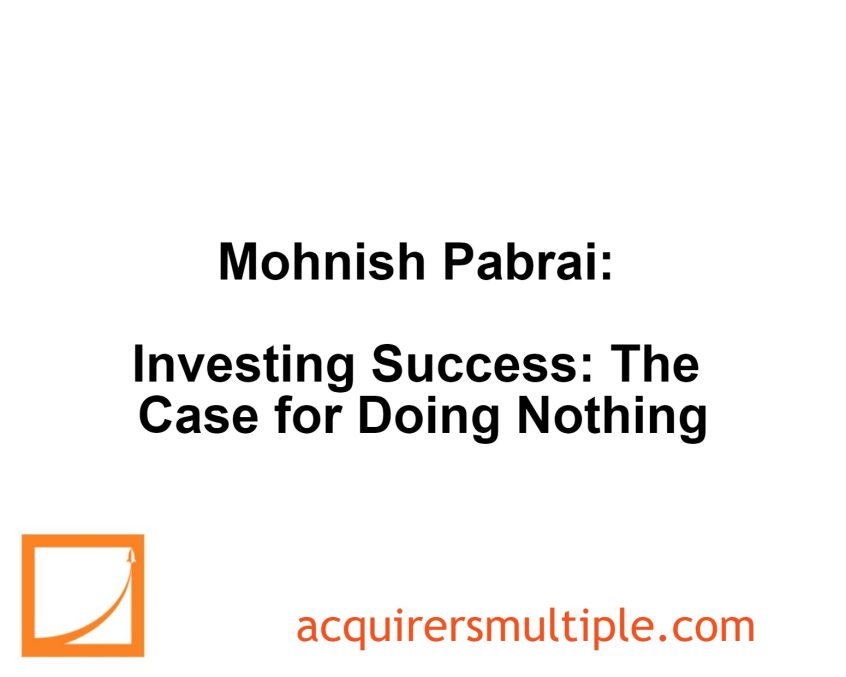In this article titled – Buffett Succeeds At Nothing, Mohnish Pabrai reflects on Blaise Pascal’s quote about misery stemming from an inability to sit quietly and applies it to portfolio managers.
He discusses D. E. Shaw & Co., a firm that achieved spectacular risk-free returns through sophisticated bond arbitrage, allowing employees to work minimally. However, boredom led them to riskier ventures, mirroring Long-Term Capital Management’s downfall.
The shift from risk-free arbitrage to risky equity markets led to near collapse due to leveraged positions. Pabrai explains why fund management is unique, where patience and correct decisions, rather than activity, are key to success, as highlighted by Warren Buffett.
Here’s an excerpt from the article:
Seventeenth-century French scientist Blaise Pascal is perhaps best remembered for his contributions to the field of pure geometry. In the 39 years that he lived, he found time to invent such modern-day fundamentals as the syringe, the hydraulic press, and the first digital calculator. And, if that weren’t enough, he was also a profound philosopher. One of my favorite Pascal quotes is: “All man’s miseries derive from not being able to sit quietly in a room alone.”
I’ve often thought that Pascal’s words, slightly adapted, might apply well to a relatively new subset of humanity: “All portfolio managers’ miseries derive from not being able to sit quietly in a room alone.”
Why should portfolio managers sit and do nothing? And why would that be good for them? Well, let’s start with the story of D. E. Shaw & Co. Founded in 1988, Shaw was staffed by some of the brightest mathematicians, computer scientists, and bond trading experts on the planet. Jeff Bezos worked at Shaw before embarking on his Amazon.com journey. These folks found that there was a lot of money to be made with risk-free arbitrage in the bond markets with some highly sophisticated bond arbitrage trading algorithms.
Shaw was able to capitalize on minuscule short-term inefficiencies in the bond markets with highly leveraged capital. The annualized returns were nothing short of spectacular—and all of it risk-free! The bright folks at Shaw put their trading on autopilot, with minimal human tweaking required. They came to work and mostly played pool or video games or just goofed off. Shaw’s profit per employee was astronomical, and everyone was happy with this Utopian arrangement.
Eventually, the nerds got fidgety—they wanted to do something. They felt that they had only scratched the surface and, if they only dug deeper, there would be more gold to be mined. And so they fiddled with the system to try to juice returns. What followed was a similar path taken by Long-Term Capital Management (LTCM), a fund once considered so big and so smart on Wall Street that it simply could not fail.
And yet, when economic events that did not conform to its historical model took place in rapid succession, it nearly did just that. There was a gradual movement from pure risk-free arbitrage to playing the risky arbitrage game in the equity markets. A lot more capital could be deployed, and the returns looked appealing. With no guaranteed short-term convergence and highly leveraged positions, the eventual result was a blow-up that nearly wiped out the firm.
Compared to nearly any other discipline, I find that fund management is, in many respects, a bizarre field—where hard work and intellect don’t necessarily lead to satisfactory results. As Warren Buffett succinctly put it during the 1998 Berkshire Hathaway annual meeting: “We don’t get paid for activity, just for being right. As to how long we’ll wait, we’ll wait indefinitely!”
You can find a copy of the article here:
Buffett Succeeds at Nothing – Mohnish Pabrai
For all the latest news and podcasts, join our free newsletter here.
Don’t forget to check out our FREE Large Cap 1000 – Stock Screener, here at The Acquirer’s Multiple:



